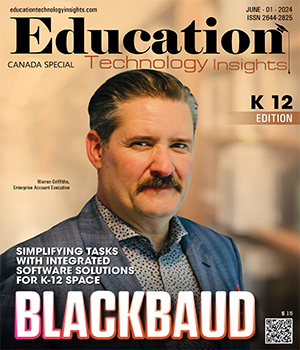THANK YOU FOR SUBSCRIBING
Be first to read the latest tech news, Industry Leader's Insights, and CIO interviews of medium and large enterprises exclusively from Education Technology Insights
Ensuring Trustworthy Information in the Digital Age
Robert Dillon, Director of Innovative Learning, School District of University City
 In an age where technology is intertwined with education, the reliability of information provided by technological tools is paramount. When students cannot trust the answers their technology gives them, it can lead to significant consequences in several key areas:
In an age where technology is intertwined with education, the reliability of information provided by technological tools is paramount. When students cannot trust the answers their technology gives them, it can lead to significant consequences in several key areas:
Critical Thinking and Problem-Solving Skills: One of the primary risks is the erosion of critical thinking abilities. Students may become overly reliant on technology for answers, diminishing their ability to analyze, evaluate, and synthesize information independently. This dependency can stunt intellectual growth and problem-solving skills, as students may accept information at face value without questioning its validity or source.
Academic Integrity: The trustworthiness of technology also impacts academic integrity. If students are uncertain about the accuracy of the information they receive, it can lead to inadvertent plagiarism or misrepresentation of facts in their work. This not only affects their grades but also their understanding of ethical academic practices.
Information Literacy: The digital age demands a high level of information literacy, requiring individuals to effectively search, locate, evaluate, and use information. When technology fails to provide reliable answers, it hampers the development of these skills, leaving students ill-equipped to navigate the vast sea of digital information.
Motivation and Engagement: Trust in technology is crucial for maintaining student motivation and engagement. If students consistently encounter unreliable or incorrect information, it can lead to frustration, disengagement from the learning process, and a lack of confidence in their educational resources.
Preparation for the Future: In a world that increasingly relies on technology, the ability to discern reliable information from unreliable information is essential for personal and professional success. A lack of trust in technology can leave students unprepared for the challenges of the future workplace, where technology and information play a central role.
"By fostering an educational environment that promotes critical thinking, ethical research practices, and digital literacy, we can better prepare students to navigate the complexities of the digital age."
To combat these challenges and ensure they are receiving honest information, students can adopt the following solutions:
Cross-Verification: Encourage students to verify information across multiple reputable sources. This practice not only confirms the accuracy of the information but also reinforces critical thinking by exposing students to different perspectives on the same topic.
Use of Credible Sources: Teach students to identify and rely on credible sources for information, such as academic journals, official publications, and trusted news outlets. Understanding how to assess a source's credibility, such as looking at the author's qualifications, the publication date, and the presence of citations, is vital.
Digital Literacy Education: Integrating digital literacy into the curriculum can arm students with the skills needed to navigate technology effectively. This includes educating them on the algorithms and biases that might affect the information presented by search engines and social media platforms.
By fostering an educational environment that promotes critical thinking, ethical research practices, and digital literacy, we can better prepare students to navigate the complexities of the digital age. This not only ensures they are receiving honest information but also equips them with the skills necessary to thrive in an ever-changing technological landscape.
Weekly Brief
Read Also
Goldilocks Regulation
Beyond the Quiz: Redefining Competence in eLearning
Beyond Theory and Into Monday Morning: Enhancing Graduate Programs for Teachers
Safeguarding Students in the Age of Deepfakes: An Educational Imperative
Delivering Excellence in Education through Transformative School Leadership
Curriculum Innovation for Student Success and Institutional Growth

I agree We use cookies on this website to enhance your user experience. By clicking any link on this page you are giving your consent for us to set cookies. More info














